- Home
- Tim Powers
Forced Perspectives Page 3
Forced Perspectives Read online
Page 3
Vickery gritted his teeth at having to let him get away, and fervently hoped to see him again.
The traffic light at Oakwood was red, but Vickery leaned on the horn and edged through, glancing quickly left and right; then he was past it, and accelerating south on Fairfax.
Castine pulled her seatbelt across and clicked it into its slot.
“Who,” she said, and took a deep breath, “were they?”
“They weren’t yours?”
Vickery flexed his right hand on the wheel. The wrist ached—he had reflexively hit that teenager pretty hard.
“What,” said Castine, “the TUA? They don’t do this sort of stuff anymore.”
Vickery nodded. She had mentioned last August that the functions and personnel of the Transportation Utility Agency had been cut way back, and its days of unsupervised ruthlessness were long past. So who was this crowd, and what did they want?
Castine shifted in her seat now to look out the back window. “They must still be behind that red light. Where are we going?”
“Parking lot up here on the right,” he said. “We only need about a twenty-second window, if you help.”
“I think I see ’em behind us now, changing lanes. Two cars. Or three.” She looked at him. “Help with what?”
Halfway down the next block Vickery stomped on the brake and swung the wheel to the right, and the car bounced up a curb and he drove fast between two rows of parked cars to an alley at the far end of the lot. He steered left into the alley, but braked to a jolting halt in front of a big delivery truck that blocked the way.
“Shit!” yelled Castine, blinking at the obstacle, but Vickery was already out of the car and crouching by the front bumper.
“Out!” he yelled. “Help me!”
He had peeled up the edges of a blue plastic film from around the left headlight, and he was tugging it up off of the fender, where a wedge-shaped chunk of styrofoam came away with the thin, sticky film as he peeled it back toward the driver’s-side door. Castine quickly followed his example on the right side, and within seconds they had stripped the blue film from the sides and the roof of the car. Two children watched them wonderingly from behind a chain link fence.
“You get the hood and the doors!” Vickery yelled, standing on the trunk now and wrestling with the bundle of crumpled blue plastic and styrofoam blocks. He leaned back, and the rest of the thin sheet came free from around the taillights with a ripping sound, and then he was sitting on the pavement. The rear license plate frame was secured only by two snaps, and he pulled it open and snatched out the blue Santa Ana dealer’s plate, exposing a red Anaheim one, and snapped the frame back into place.
He rolled over to the right and shoved the sticky blue-and-white bundle under the car, just forward of the right rear tire, as Castine slid to a crouching halt beside him, a somewhat smaller bundle in her arms. She pushed it too under the car, rattling fragments of a broken beer bottle on the pavement.
The car blocked their view of the parking lot they had just driven through, and Vickery couldn’t see under the vehicle because of the masses of crumpled plastic and styrofoam. But he heard a car, and then another, come rocking into the parking lot from Fairfax.
“Move to the front,” he said hoarsely, “and slide around to the bumper when they pass this.”
The roar of car engines quickly grew louder, and Vickery waved at Castine and began crawling toward the front of the car; and they had both scrambled around to crouch by the front bumper when two cars turned right and gunned away up the alley away from them.
“Are there any more?” gasped Castine, sitting up on the cracked cement pavement. One bloody knee showed through a rip in her slacks and she pushed her tangled hair back from her face. “There’s broken glass all over the place.”
“Give ’em a minute.” The breeze on his scalp let him know that his hat was gone. “I think they were following you. One of them shook some kind of powder into your water glass, and it was another of them who knocked it over.”
Castine was getting to her feet, cautiously. “They couldn’t have followed me! You’re not the only one who’s been trained in this stuff, you know.”
Vickery stood up, wincing and rubbing his hip. “Then they knew when and where we were supposed to meet,” he said, looking north along the alley. He didn’t see any moving cars. “We’ve got to get clear of the area.”
Vickery’s sedan was now visibly a white 1990s Saturn, with dented fenders and a primer-red driver’s side door. He and Castine got in, and he backed it off of the tangled mess of blue plastic and then drove sedately out of the lot and turned right on Fairfax. The interior of the car was hot from sitting in direct sunlight, and he switched on the air conditioner. Dust and hot air blew out of the vents, then cooler air.
Vickery took off his sunglasses and waved them toward Castine. “Put these on,” he said, “and there’s a blanket in the back seat—pull it around yourself.”
The blanket was bright yellow, and Vickery hoped that the changes in their appearances would deflect the attention of any very attentive pursuers.
He caught a green light at Beverly Boulevard and sped through the intersection, watching his rear view mirror; but no cars seemed to be following them.
“This is a Saturn,” said Castine, gingerly tucking the old blanket around her shoulders. She peered out through the windshield. “White. It looked like some kind of . . . caricature sky-blue Mercedes a few minutes ago. And I never told anybody that we were to meet at Canter’s.”
Vickery pursed his lips. “I believe you. I—”
“Oh, thanks!” A box of Kleenex was wedged between the dashboard and the windshield, and she pulled a sheet free and dabbed at her cut knee.
“Well, I do,” said Vickery. “But there they were.” He glanced at her. “Did you recognize any of them?”
“Damn it—I thought we were through with this kind of stuff! Have you . . . done something?”
Vickery made himself keep the nervous irritation out of his voice: “I’ve been living very low profile in a trailer park outside Barstow, under a new name, since February.”
“Well—I haven’t done anything either. No, I didn’t recognize them. I hardly saw them. Something broke, and some guy knocked over my water glass, and then you threw him and some kid onto a table.”
“I,” Vickery said heavily, “recognized the one who put something in your glass.”
“So you do have some connection with this!”
“It was before I went dark. It was why I went dark. Eight months ago, in February, that guy and a couple of other people cornered me. Tried to.” He started to mention the stolen book, but said instead, “I’d had a new identity prepared and ready to assume since September of last year—”
“I should have cooked up an escape identity myself!”
Vickery rocked his head judiciously. “—And I stopped being Sebastian Vickery altogether.”
“And you only ran as far as Barstow? What’s that, a hundred miles?”
“A hundred and fourteen.” Vickery made a left turn and drove east on Third Street, past the old Farmer’s Market clock tower. “Why did you place the ad?”
“Oh. I guess I got you into this, didn’t I, with that ad? Back into it, anyway. Sorry, I guess. Why did I put the ad in the paper.” She was silent for a moment, then shrugged. “Because I was scared.”
“Well, yeah, I’ve been scared too,” Vickery admitted, alternately watching the traffic ahead and glancing at the rear view mirror. The sun was bright on chrome and windshields, and he wished he hadn’t given Castine his sunglasses. “Before I went into the restaurant just now, I tried the look-in-the-past trick to see the street a little while earlier—and for once the trick still worked, I did see that.”
“You were lucky.” She shivered. “I never even try it anymore, and I drink gallons of coffee to stop it happening spontaneously. All I see now, when it happens, is—”
He nodded grimly. “That solitary wrecked h
ouse.”
“Ooh, I’m glad you see it too, Sebastian! Right, a two-story Victorian house, all dilapidated, in some kind of little valley, right? And you can’t move, not voluntarily, anyway. In the—hah!—ordinary visions of the past, I could at least decide whether I walked in some direction, or held still.”
“True. These intrusive new ones are like watching a video.”
“And,” she went on, “have you noticed that each time you see that terrible house, it’s always later in the day? A month ago I’d see it with shadows, but lately they’re gone, like it’s noon, there.” She was hugging herself now, gripping her elbows. “I don’t want to see it when the sun’s down. If I even could see it much, in that murky light.”
Vickery decided not to ask her yet if she’d noticed the man’s face that he had sometimes seen peering out from an upstairs window of the hallucinated old house.
“Yeah,” he said, “I’ve noticed that it’s later in the day, in some day, when I’ve seen it.”
“Do you think that has something to do with—” She waved behind them.
Vickery briefly spread his fingers on the steering wheel, then gripped it again.
Castine hitched around to peer out the back window, then relaxed back into her seat. “Where are we going?”
“For now, just—away.”
She nodded. “Away is good. Do you think it was arsenic or something? In my water glass?”
“Whatever it was, the guy in the turtleneck didn’t want you to drink it.”
After a moment of silence, she said, “I’m glad you were there. It’s sort of good to see you again, Sebastian. Though I’m not sure I like the beard.”
“My name’s Bill Ardmore now.” She raised her eyebrows, and he went on, “The real Bill Ardmore was a grocery clerk in Oshkosh, Wisconsin, and he died last May, single and childless.”
“You . . . liked the sound of the name?”
“It’ll do. Are you watching traffic?”
“The only car that’s been steady in view for the last thirty seconds is that old Chevy with kids in it that you just passed. Ah—and they just turned into the Ralph’s parking lot anyway.” Her knee had apparently stopped bleeding, and she rolled down the window and threw the blood-spotted Kleenex out.
“I got the name from an obituary,” said Vickery. “All the states cross-index death and birth certificates these days, but Wisconsin didn’t start doing it till ’79, and Bill Ardmore was born in ’78; so I’m officially forty now, instead of thirty-seven.”
“Oh.” She rolled the window back up. “I hope I don’t have to do that myself. I’d be adding nine years. Did he have a beard?”
“Probably not. But I grew it because Sebastian Vickery didn’t have one.” He squinted at the traffic ahead. “I’m going to circle some blocks, so keep watching traffic. Then we can stop at MacArthur Park and catch up on—everything.”
“I never did get lunch.”
“We can probably get a couple of hot dogs or something there.”
“Of course.” Her smile was faint, but he felt at last that this was the same woman he’d known last year. “I forgot about your dining style,” she said.
Back at the Canter’s parking lot, two men stood on the sidewalk, blinking in the sun.
“Where’s the cars?” one asked. He appeared to be in his early forties, and was dressed a bit too young in black skinny jeans and a faded blue denim shirt buttoned to the top. His head was entirely shaved and gleaming with sweat, and he wore sunglasses with a little leather wedge snapped over the bridge. “I’m going to go to that thrift store and see if they have any decent hats.”
“When Harlowe shows up,” said his companion, “he’s not going to be happy. Pratt got knocked out back there, with his jaw dislocated, and now the Castine woman knows somebody’s after her. You best not be off hat shopping.” His brush-cut hair was gray, his tanned face was deeply lined, and his olive-green windbreaker and blue jeans were calculatedly unmemorable.
“Damn it, Taitz, what were we supposed to do? The car didn’t even have a license plate, just a dealer’s plate!”
“Harlowe didn’t say you should try anything like opening her door. This whole thing was supposed to be just . . . let her meet Vickery and then follow them, and grab them somewhere less crowded. But I guess it was Elisha that really screwed it up.”
The other man nodded. “What, he broke some dishes?”
An old woman who had just finished laboriously pushing a shopping cart to this end of the Oakwood crosswalk paused and said, as if talking to herself, “Harlowe says he tried to poison her.”
The younger man stared at her in alarm, and as she hobbled past them he took a step after her.
Taitz caught his arm. “Steady, Foster. You think she knows anything? It’s just the black hole effect. We’re lucky somebody across the street didn’t say it.”
“For all we know somebody did! Maybe half a dozen people did.” Foster shook his head and wiped his bald scalp. “Shouldn’t our guys have caught up with them by now? Shit. That didn’t look like any powerhouse car Castine drove away in.”
“It was Vickery driving, if that guy was Vickery.”
“And he’s what, some kind of hobo?”
Taitz shrugged, scanning the cars east and west for some sign of Harlowe’s gray Chevrolet Tahoe SUV. “He showed up in L.A. about five years ago, and nobody seems to know where he came from. Eight months ago Elisha and Agnes tried to snatch him, and blew it, though they did get that book Harlowe wanted. Then Vickery totally dropped out of sight—until today, maybe—but before that he was working for a Mexican woman in East L.A., driving some kind of tricked-out santeria stealth cars for people scared of ghosts.”
“And, uh, he and the Castine woman both died last year, I understand, and came back from the dead.”
“That’s the story.” John Taitz waved toward the old woman with the shopping cart, who was still visible making her way up the Fairfax sidewalk. “That’s why we need them, both of them.”
“There’s Harlowe.” Foster stepped to the curb and waved at the westbound lanes of Oakwood Avenue, and a few moments later a gray SUV surged across the Fairfax intersection and swerved to a stop beside them. Taitz hurried to the curb and opened the left rear door and got in, with Foster right behind him.
The middle pair of seats had been reversed, facing the third row, where Simon Harlowe sat. The sleeves of his turtleneck sweater were rolled back, and his probably-dyed burgundy red hair was disarranged, but he looked a good deal more alert and purposeful than he had this morning, when they had lost track of Castine. He crossed his left red boot over his right knee and waved Foster and Taitz to the facing seats as the vehicle moved forward.
“Elisha has gone rogue,” he said, and added in a businesslike tone, “one of you is going to have to take his blood pressure.” Taitz repressed a wince; he had got along well enough with Ragotskie, and he hoped it would be Foster’s task to kill the young man. “The Black Sheep is being moved to a different marina,” Harlowe went on, “and I’ve told Biloxi to vacate the office on Sepulveda—put everything in a couple of U-Haul trucks and park it somewhere till we can move it to another property I’ve got.”
Taitz shifted uneasily. “Any luck following Castine?”
“No,” said Harlowe. “That blue car, whatever it was, simply turned in to an alley and disappeared. We had four cars circling fast around all these blocks, and up and down Beverly and Third—no sign of it.”
“We had a black hole incident here a minute ago,” said Taitz. “An old woman walked by us and said Elisha tried to poison Castine.”
Harlowe nodded, rubbing his chin. “Were you two holding hands?”
“No,” said Taitz.
“Well, you were standing close to each other, I imagine, and not moving. It’s not premature.” He raised his hand to preclude any objection. “Castine and Vickery are apparently traveling together, and,” he went on, patting a polished wooden box on the seat beside him, �
��we’ve got the bloody sock to see where she goes. Unless they get on a plane real quick, which isn’t likely, or that wasn’t Vickery she met, which also isn’t likely, we should have them both in the mix within the next few hours.”
“We’d better,” said Taitz. “Halloween’s only two days off, and if you haven’t got a pair of . . . communicators by then—do you think it’s even still possible to damp the whole show down and try for next year?”
Harlowe sat back and gave Taitz a benevolent smile. “Well, John, I tell you what. No, it’s not still possible. This thing is gonna take wing on the thirty-first whatever we do, and if we don’t have the right couple of people incorporated—our routers, our switchboard operators, our thalamus—then we’re all gonna be facets of one big cosmic imbecile. But,” and he eyed Taitz with something like cautious amusement as he went on, “if we don’t get Vickery and Castine for it, we can use the twins.”
Taitz squinted at him. “The twins? You mean your nieces?”
“I’ve had them in mind all along—lately as a fallback. They’re a bit—”
“Crazy,” said Taitz flatly.
“Now now. They’re neurotic and deluded, but in directions that make them very suitable. I’d rather have Vickery and Castine, but the twins can do it.”
“You think everybody will . . . go along with that idea?” asked Taitz. “They’re all real serious about this thing.”
Harlowe’s genial expression slipped for a moment, and Taitz forced himself not to flinch at the blazing eyes in the momentarily slack face; then the serene smile was reassembled, and Harlowe said, softly, “I’m more serious than any of them, and I know more about it than any of them.”
Foster, looking out the window, had missed the momentary glare. “The twins,” he echoed wonderingly; then added, as he turned to his companions with a visible shudder, “At least Lexi and Amber want to be something besides themselves.”

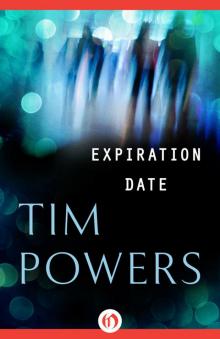 Expiration Date
Expiration Date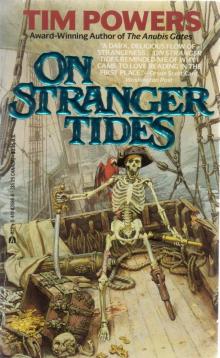 On Stranger Tides
On Stranger Tides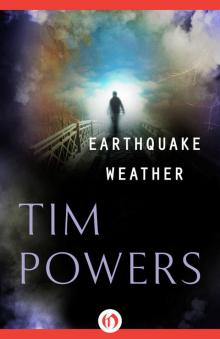 Earthquake Weather
Earthquake Weather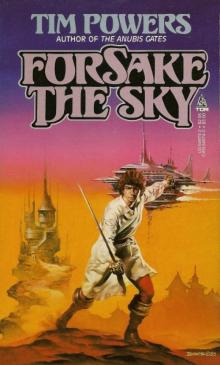 Forsake the Sky
Forsake the Sky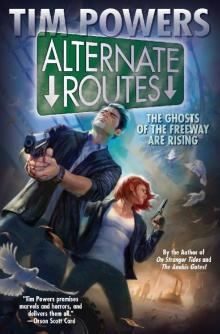 Alternate Routes
Alternate Routes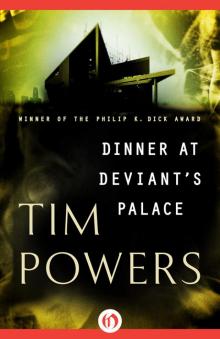 Dinner at Deviant's Palace
Dinner at Deviant's Palace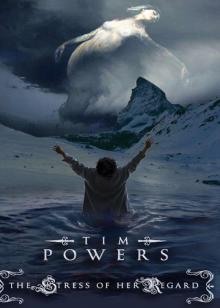 The Stress of Her Regard
The Stress of Her Regard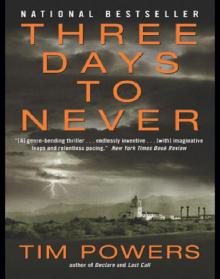 Three Days to Never: A Novel
Three Days to Never: A Novel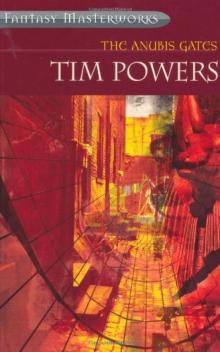 The Anubis Gates
The Anubis Gates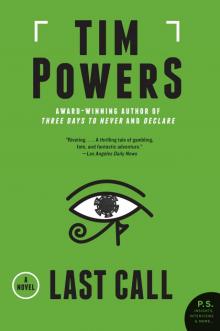 Last Call
Last Call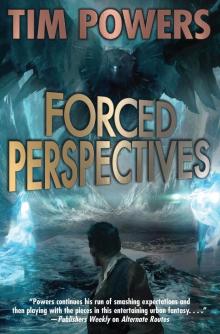 Forced Perspectives
Forced Perspectives Strange Itineraries
Strange Itineraries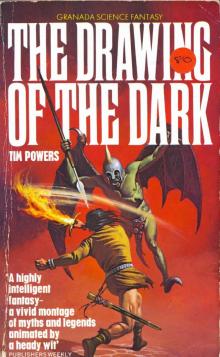 The Drawing of the Dark
The Drawing of the Dark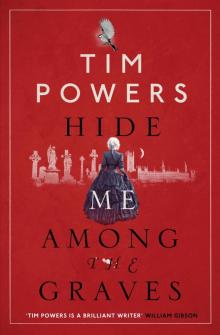 Hide Me Among the Graves
Hide Me Among the Graves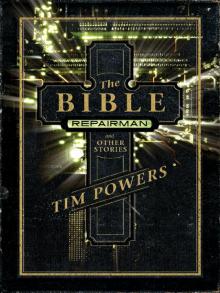 The Bible Repairman and Other Stories
The Bible Repairman and Other Stories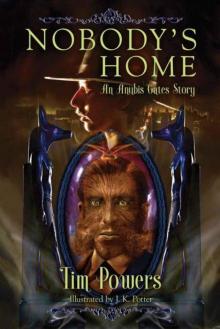 Nobody's Home: An Anubis Gates Story
Nobody's Home: An Anubis Gates Story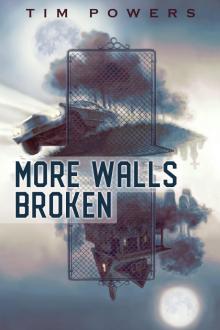 More Walls Broken
More Walls Broken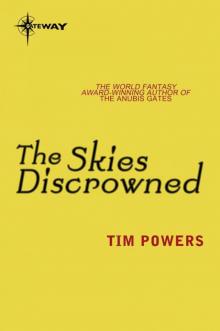 The Skies Discrowned
The Skies Discrowned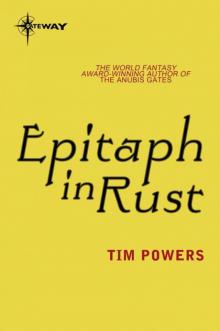 Epitaph in Rust
Epitaph in Rust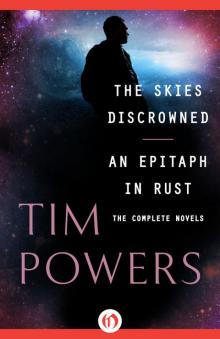 Skies Discrowned and An Epitaph in Rust
Skies Discrowned and An Epitaph in Rust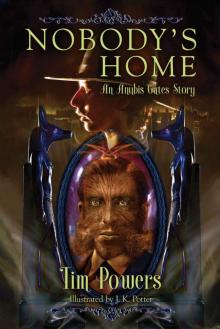 Nobody's Home
Nobody's Home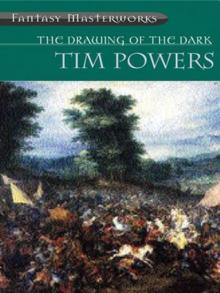 Drawing of the Dark
Drawing of the Dark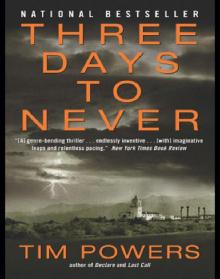 Three Days to Never
Three Days to Never